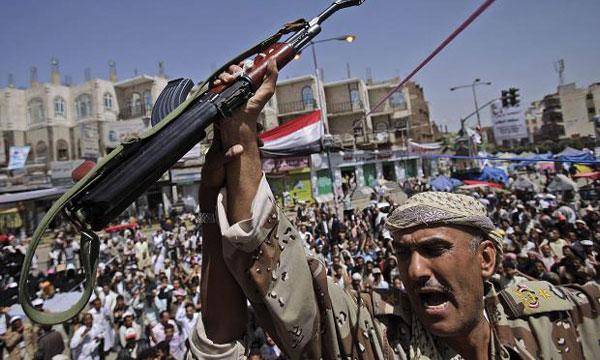The formulation of military alliances is a part of the strategic calculus of international politics, global military operations and interventions. Unfortunately, there is no central system which could authorise the legitimacy of military alliances at a global level. Some military alliances have geo-strategic interests while others pursue their geo-political interests without any set principle. For instance, the current military alliance and foreign intervention in the Syrian crisis is operating to topple the legitimate rule of the Assad regime while contrary to that, almost the same kind of military alliance is in action to back the legitimate rule of Mansur-ul-Hadi in Yemen. Perhaps this contrast is more ridiculous than unfortunate. That is why idealists believe that there is no central authority in the international system which could keep a check over different violations. However, believers of “might is right” argue that it in itself is a guiding principle to operate in the international system of states.
Middle Eastern monarchies follow the same contrary policies to guard their own geographical, political and sectarian interests. The most disastrous factor is the powerlessness of international organisations like the United Nations. It is no more a secret that UN and UNSC have fatally failed to resolve major international disputes including Kashmir and Palestine. The role of United Nations in the Yemen Crisis is limited to counting humanitarian loss and ceasefire appeals to international powers. According to UN reports, 4000 civilians lost their lives among 11,000 other causalities. Moreover, around 31 million people are internally displaced, so the crisis is far severe than anyone can imagine.
The dilemma is that the powerful always find their way through the power they hold. Being mighty and powerful, a state hardly thinks about other options including talks and political settlement. History has taught bitter lessons to the giant military alliances in Iraq and Afghanistan. NATO and ISAF were the leading military alliances in Afghanistan, nevertheless, at the end, all global powers including the US are seeking the way forward through dialogue with Taliban. In the same way, the US invasion of Iraq has been a proven failure of the use of power. However, political engagement somehow worked in Iraq and a democratic setup took charge of affairs. No doubt, complete political stability will definitely take a long time yet it is far better than complete chaos.
Yemen possess a history full of crisis. It was a bone of contention between the Ottoman Empire and the British Colonial regime. Then it was the battleground between the powers of North and South. Yemen remained divided into Yemen Arab Republic (controlled by army rebels in north) and the People’s Republic of Yemen (controlled by the revolutionaries of south). The unification of Yemen took place in 1990 after almost 12 years of bloody civil war. Unfortunately, Yemen has plunged into another civil-war situation after the famed Arab Spring of 2011.
The most disappointing factor in the crisis, is the Alliance of Gulf Cooperation Council to use force, particularly air strikes on the Houthis, which is a self-proclaimed revolutionary group against the central government’s President Hadi. The coalition partners including Saudi Arabia, United Arab Emirates, Bahrain, Kuwait, Jordan, Qatar and Sudan argue that they are fighting against the rebels to strengthen the central government. If we agree to this principle, then these forces or other foreign forces should also fight against the rebel forces of Syria to strengthen the Assad regime. Obviously, this is not the case. Wars were never fought on principles but on vested political and geo-strategic interests. All the coalition partners should calculate the dividends of this war from the example of recent wars. The post 9/11 US invasion in Afghanistan had nothing to do with Pakistan, but for one reason or the other, Pakistan jumped into that and supported the US invasion on strategic, diplomatic and moral fronts. Resultantly, the war dragged into the territories of Pakistan and Pakistan has lost 80,000 thousand lives including 48,000 civilians and an estimated financial loss of $188 billion. Therefore, foreign forces should act sensibly and push Yemen towards the political solution.
While seeking a peaceful solution, we also cannot expect a democratic move in Yemen to tackle the current chaotic situation. Democratic change will be another impossible choice as the Middle East is a region full of monarchs, some are absolute and some monarchies are constitutional. Therefore, the Middle Eastern political elite will not approve a democratic way out. Egypt has a strong dictator and is also a leading partner in the coalition, therefore democracy would never be an option, not even the last option. Transitional government could be a viable option for both sides and coalition forces. The immediate focus should be on discontinuing violence and ceasefire instead of long-lasting solution of the dispute. Complete division of North and South could be another alternative but cannot be opted in this situation. United Nations can take the lead in division, once the situation gets under control and lives become normal.
Violence, the use of force and wars cannot be used as routes to stability in the 21st century. If the use of force could bring stability, Kashmir would have been the most stable region of the world. If violence could have an ability to ensure peace, Palestine would have the most peaceful location. If foreign invasion could bring political stability, Iraq and Afghanistan would have been politically stable after decade-long invasions. We should not expect any reasonable way out from USA, UK and France, who are supporting the intervention of Gulf countries in the Yemen civil war. However, Pakistan should take the lead to convince brotherly states of the Middle East for immediate ceasefire. The Parliament of Pakistan unanimously decided to be neutral in the crisis, yet I think that practical neutrality demands that efforts to persuade opposing parties for negotiated settlement are necessary. Neutrality only clarifies your position and that you’re not party to the conflict, however, neutrality does not bar you to play your part in conflict resolution.






